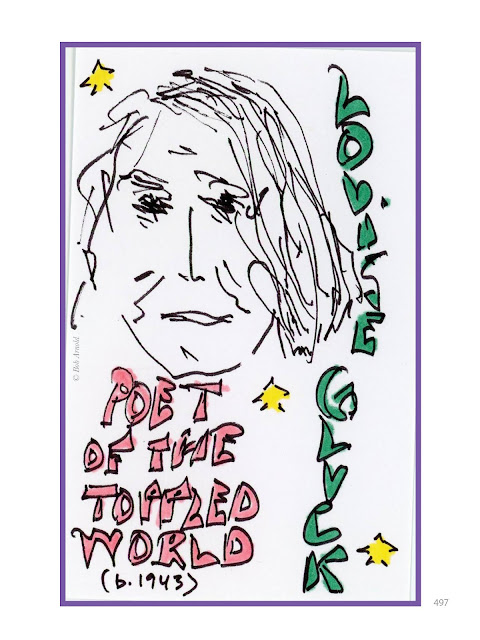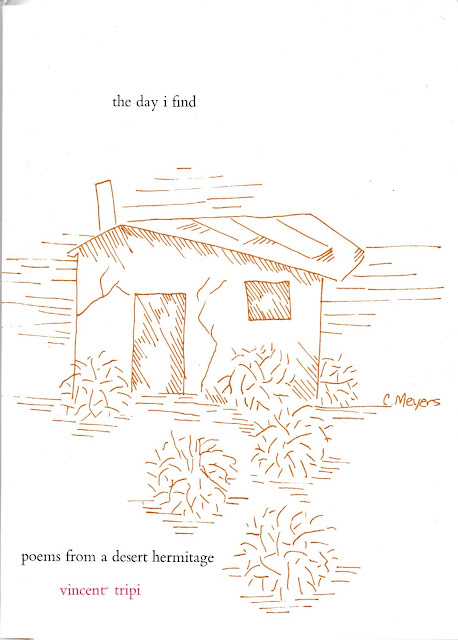P O E T S W H O S L E E P
Monday, March 15, 2021
POETS WHO SLEEP #42 ~
Saturday, March 13, 2021
Friday, March 12, 2021
VINCENT TRIPI ~
With her pan
the old prospector
points upward
— for Laura Bell
______________________
Vincent Tripi
the day i find
poems from a desert hermitage
1725 Marion Avenue, Apt 12-I.
Novato, CA.
_________________________
according to his inscription, Vincent
sent me a gift of this fine book of short
poems when he was living in Novato, CA.,
and come to think of it Sweetheart and I
passed through there some years earlier —
I believe Vincent even tried to look us up
in Vermont when he was living just down
river from us but I guess he got lost, as
others have, long before GPS took the fun
out of everything — Vincent passed away
last Fall and I'm thinking about him now
[ BA ]
Thursday, March 11, 2021
Wednesday, March 10, 2021
Tuesday, March 9, 2021
Monday, March 8, 2021
POETS WHO SLEEP #41 ~
P O E T S W H O S L E E P
Sunday, March 7, 2021
HAPPY BIRTHDAY! JOHN McPHEE ~
John McPhee poses for a portrait in his office at Princeton University in Princeton, N.J. Bryan Anselm—Redux for TIME
H A P P Y B I R T H D A Y
J O H N M C P H E E
March 8, 1931
ANCIENT BASEBALL ~
The lively spirit and busy fingers of
Alfred Jarry and Rube Goldberg live-on
to this day out of the Catskills of New York
and its very own Mikhail Horowitz via
Ancient Baseball, where Mikhail has long worked
his workshop of collages. No easy-street photoshoppy
stuff here. Each collage from baseball land, includng
"Babe (Ruth) in the Manger" were done with old-school
finesse — hand wrought cut & paste w/scissors,
straight-edge razors please, and whiff the
room with paper cement.
Ah, it does make a style and grace.
[ BA ]
_________
__________
Alte Books
30 Old Whitfield Road
Accord, New York
12404
Friday, March 5, 2021
RE-READING ASHA BANDELE ~
absence in the palms of my hands
for audre lorde
i will eat the last signs of my weakness
remove the scars of childhood wars
i made you this promise as
humble as mary washing the feet of her savior
it was an unsteady may afternoon &
we were standing in the doorway of the home you had adopted
you let me there with
your head raised and still dreadlocked walking
toward the beginnings of your death
i didn't say i'd never take the chemo you told me
& though i know we must have spoken after this day
these are the last words i ever remember hearing from
you
audre
i learned to face the complexity of living watching you
face the complexity of dying
never do it on your knees never do it with your back turned
never do it with your eyes
low
i learned dialectics watching you at war
a defiant soldier for peace against the serenade of violence
inside & outside
your body a mighty oak refusing
to be scorched in silence
these days
in the face of necessity battles i know i must
never forget the warnings of my woman's flesh
nor lose the terror that keeps me brave*
but this morning your memory informs my tears
thick & isolated
unable to rest
it has been two years now but
death does not know time and
your absence aches in the palms of my hands
but i am also angry
i curse the disease because cancer is not natural
nor the act of an unforgiving God
crossing the world we once shared
i see
poison passed off as food water air as
good earth upon which we may live or clear out
the next rainforest to make room for a grinning clown
& hamburger stand
the whole world
is being nourished on big macs & radon
staring westward at hollywood for daily salvation
& we do not understand our 5 year olds
when their eyes melt
& they do not scream only
shrug
in the solitude of my writing i place
your poetry around me like a makeshift altar
& pray my generation of poet-historians
will abandon any urge toward the mirage of relevance created 'cause
WE BLEW UP THE SPOT YO!
in the urgent hour of now
we need stories beyond shock value whose
focus is transformation
or at least the prayer that
we will write no words we will not want spoken out of
the mouths of our children
that we will owe nothing we cannot repay.*
*from "Solstice" by Audre Lorde (in Black Unicorn)
__________________________________
absence in the palms of my hands
asha bandele
Harlem River Press, 1996
Wednesday, March 3, 2021
RE-READING FERRUCCIO BRUGNARO ~
We Don't Want Bosses, Period
We don't want bosses of any kind,
period.
They've already splashed around
in our blood,
already feasted plenty
on our lives.
Stop asking us so many questions.
Look at our injuries
the damage done to peasants
and miners.
We've gotta yank this plant out of the world
once and for always.
Don't ask anything else of us. We've really
made up our guts.
We don't want bosses
because they're
the same as ever;
because they want the land
all for themselves,
because they never stop
robbing, trampling
and killing, killing
day and night under every kind of sky.
_________________________
translated by Jack Hirschman from the Italian
Ferruccio Brugnaro
FIST OF SUN
Curbstone Press, 1998
Ferruccio Brugnaro worked for 30 years —
most of his adult life — in an industrial park of
chemical factories in the Porto Marghera district of Venice.
Well known as a worker-poet he shared his poems for years,
printed in mimeo format, to workers at the factory and in many
schools he visited. Poet & translator Jack Hirschman chose for this
collection from three previous books by Brugnaro: We Must Want To,
The Silence Doesn't Rule and The Clear Stars of These Nights.
Born in Mestre Italy in 1936, Ferruccio Brugnaro has retired from
the factory shift and now devotes his full-time to writing.
[ BA ]
Tuesday, March 2, 2021
Monday, March 1, 2021
POETS WHO SLEEP #40 ~
P O E T S W H O S L E E P
Sunday, February 28, 2021
JANE MEAD ~
Seventy Feet From
The Magnolia Blossom
there is an ant.
He is carrying
a heavy load —
We should help him.
______________________
Jane Mead (1958~-2019)
The Usable Field
Alice James Books
2008
Saturday, February 27, 2021
Friday, February 26, 2021
Thursday, February 25, 2021
RE-READING LOCAL LIVES (MILLEN BRAND) ~
Misplaced Kansas
In nineteen forty-nine,
when the Walter Shuhler farm
was about fixed up as a dairy,
a cyclone came up Butter Valley,
Sunday evening, "a little before nine —
twenty minutes to nine," the sky darkened.
"We were in the barn. Didn't hurry.
We had this and that to do,
but as we came to the house,
we saw it was very black,
and I noticed a flickering, I said to Florence,
'It's a cyclone over the hill there.'
I recognized it from Kansas,
we ran then. I wanted to pull the electric switch
in the cellar. I told the family,
'Keep away from the window.'
Lucky they were all inside.
When I pulled the switch, it was pitch dark.
I could see flashes. I could see rafters fly over
I didn't know they were from my own house.
There was a kind of deep roaring hum
that the wind and pressure make.
Everything was rocking and shaking,
whatever could shake. It was over
in about fifteen seconds.
We were the worse hit in the valley.
The house roof was off altogether,
and the chimneys. Most of the windows frames
were pushed right in. Outside,
everything was mashed up. The silos down.
All the big trees were over, flattened.
You can still see the stumps.
It came from the south
and was only a few hundred feet wide.
We were hit right in the middle.
If it wasn't for the house that split it,
it would have taken the barn. As it was,
when the house split it,
one part went down this way
and took the roof off a small pig stable.
The other part went that way
and took a chicken house, everything —
took it all away. The chickens
were scattered on the hill and next day
came walking back. I heard a few
were down in Clayton close to that
manufacturing place down there.
The barn wasn't hit
but on the barn side near the house
about fifteen feet of boards
broke where the house roof blew against it
and pushed the frame about two inches.
But just so the barn stayed. Lucky
the cattle were in the barn, it didn't hurt them.
I had started to make a hen house
out of a temporary croncrib.
I had two two-by-fours
nailed with eightpenny nails,
and the wind tore one of them to pieces
and din't touch the other.
Still it wasn't as bad as a fire.
But it was bad enough.
The trees that were over broke fences.
We were most of the night clearing the lane.
The next day,
shingles, tin, and nails lying all over
in the meadow and the fields.
If the cows eat wire or nails,
it will kill them, so we carefully
cleaned off the meadow first — that was still
where we mainly fed the cows —
and let the cows out. We put
a canvas over the house roof
and four days later, by Thursday,
we had the roof back on.
It was a cyclone, all right. Strange,
there never was one before
and never was one before
and never has been one since.
I've seen it in Kansas, a cloud
let down a wind funnel that would shoot along
faster than you could run
and everything it touched was gone.
But who'd think
that Kansas would chase you here?"
__________________________
Millen Brand
Local Lives
Poems of the Pennsyvania Dutch
Potter, 1975
__________________
a gem of a book, published when Millen Brand was nearly 70 years old, having written the collection over some thirty-five years. Brand is Pennsylvania German on his mother's side and lived for many years on Crow Hill near Bally amongst the farmers, tradesmen, factory workers, women and children and fellow storytellers. There is no book of poems like this one. The poems John Berger drew out of rural France in Pig Earth is akin, as is Drum Hadley's Borderland, and I'll be drawing from both those books over the next few weeks.
[ BA ]

















































































